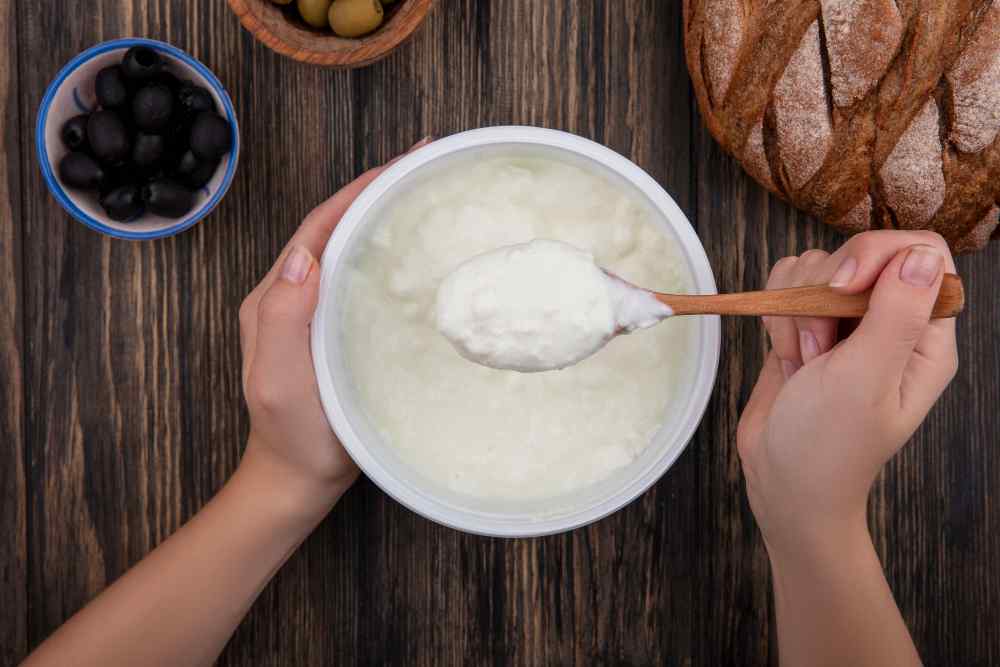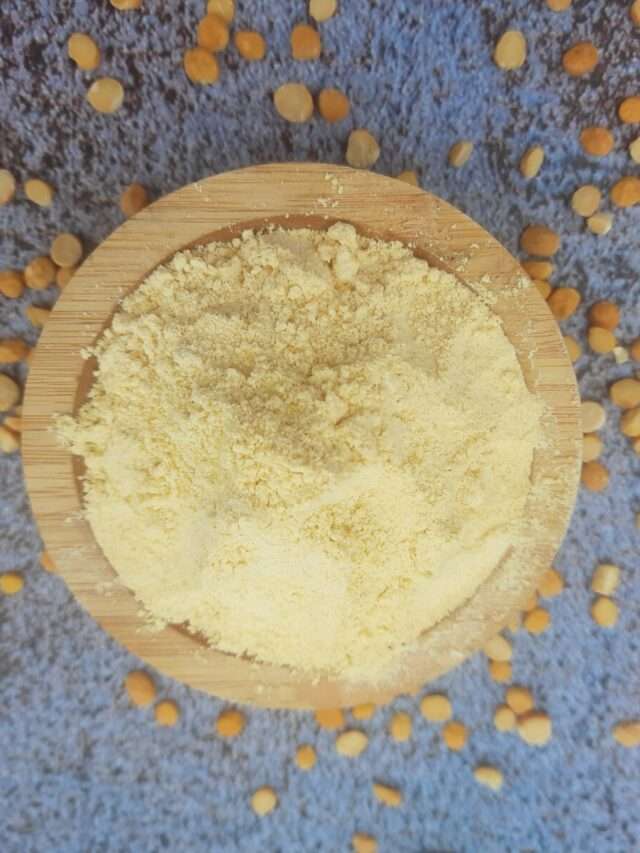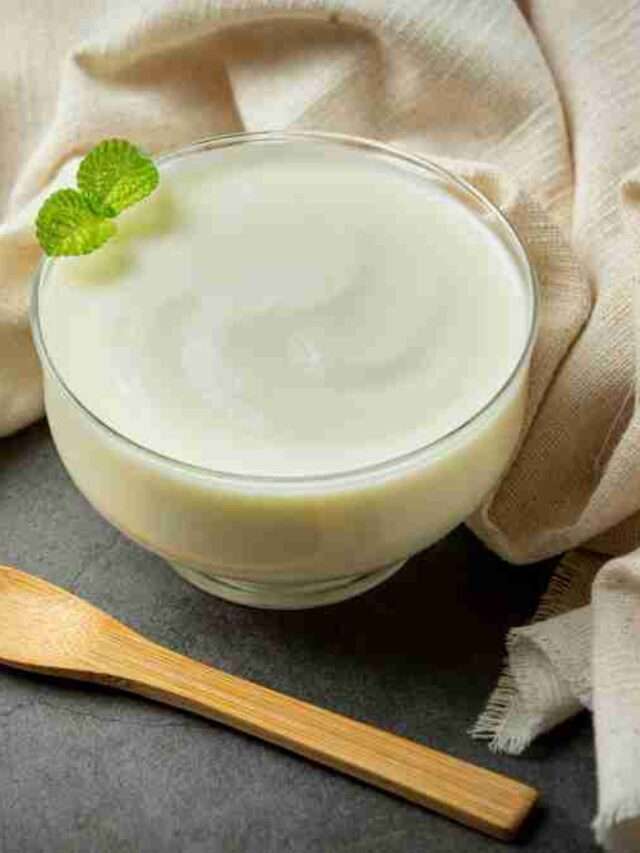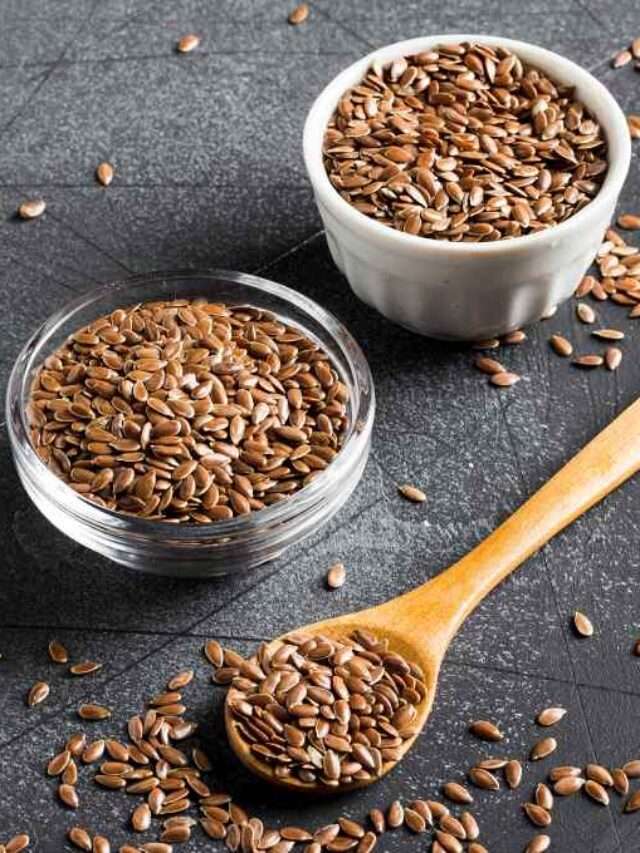Consuming curd in the right way can offer numerous advantages for overall well-being. Curd provides essential nutrients that contribute to both our physical and mental health. In this blog, we will delve into the nutritional content of curd, its probiotic properties, its impact on digestion and the immune system, as well as its positive effects on bone health, skin, heart health, and weight management.
Curd (yogurt) is an ancient Indian food item with its origins dating back to antiquity. It is prepared by fermenting milk with curd culture or adding honey, which results in a creamy and delicious dairy product. The health benefits of curd consumption can be attributed to the presence of probiotics, which are beneficial microorganisms and bacteria.
READ MORE: Easy Handi Paneer Recipe at home
Nutritional Profile of Curd
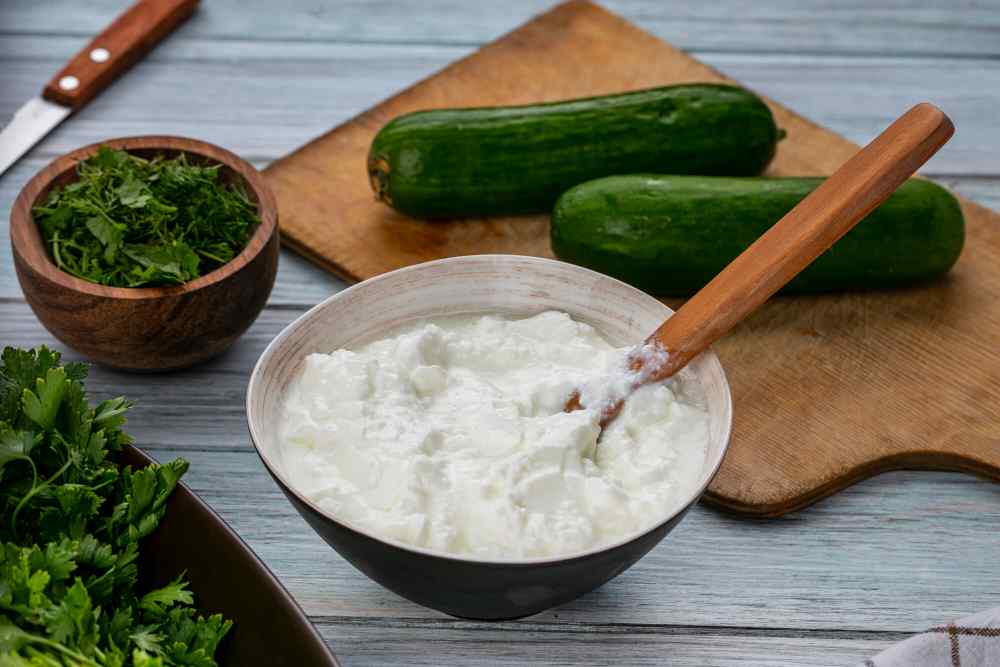
A. Key nutrients present in curd (protein, calcium, vitamins, etc.)
Curd is a nutrient-dense dairy product that provides essential nutrients vital for our body’s optimal functioning. It contains:
- Protein: Curd offers a rich source of high-quality protein, which plays a crucial role in muscle repair, growth, and overall tissue health.
- Calcium: Dahi (Curd) is known for its calcium content, essential for maintaining strong bones and teeth, and supporting muscle function and nerve transmission.
- Vitamin B12: Curd contains Vitamin B12, vital for red blood cell formation, nervous system health, and DNA synthesis.
- Phosphorus: Essential for bone health and energy metabolism, phosphorus is also present in curd.
- Vitamin B2 (Riboflavin): Curd serves as a good source of Vitamin B2, aiding in energy production and supporting antioxidant activity.
- Magnesium: Dahi (Curd) contributes to our magnesium intake, which is essential for muscle function, nerve transmission, and energy production.
- Zinc: The presence of zinc in curd supports the immune system and is involved in several enzymatic processes in the body.
- Vitamin B5 (Pantothenic Acid): Vitamin B5 in curd helps in breaking down carbohydrates and fats for energy.
- Vitamin B6: Curd provides Vitamin B6, important for amino acid metabolism and neurotransmitter synthesis.
- Vitamin A: Curd contains some Vitamin A, crucial for vision, immune function, and skin health.
B. Curd Compared to Milk and Other Dairy Products
yogurts is made from milk, and while the nutritional composition of curd and milk is similar, there are some differences due to the fermentation process. Here is a comparison of curd’s nutritional content with milk and other dairy products:
- Protein: Curd and milk have similar protein content. However, the fermentation process in curd may lead to slightly more concentrated protein due to the removal of some whey.
- Calcium: Both curd and milk are good sources of calcium, but curd may have a higher calcium concentration due to fermentation.
- Lactose: The fermentation process in curd reduces lactose (milk sugar) content, making it a more tolerable option for individuals with lactose intolerance.
- Probiotics: Curd is unique among dairy products as it contains probiotics, beneficial bacteria that promote gut health. Regular milk does not contain probiotics.
- Calories: Milk and Curd generally have similar calorie content, but this can vary based on the fat content of the milk used to make curd.
Compared to other dairy products like cheese or butter, curd is generally lower in fat and calories, making it a healthier option for those looking to manage their weight or reduce fat intake.
Overall, curd is a wholesome dairy product with a nutrient profile that provides numerous health benefits, especially when consumed as part of a balanced diet.
Gut Health and Probiotics

A. Probiotics: Essential for a Healthy Gut
Probiotics are very crucial in maintaining a healthy gut. They consist of beneficial live microorganisms, including certain strains of bacteria and yeasts, which provide numerous advantages for digestive health. When you consume probiotics in adequate amounts, they positively influence the balance of gut microbiota and promote overall well-being.
B. Curd’s Role in Promoting Gut Microbiota Balance
Curd, a natural source of probiotics, significantly contributes to promoting a balanced gut microbiota. During the fermentation process of curd, lactic acid bacteria, such as Lactobacillus and Bifidobacterium, multiply and thrive. These beneficial bacteria are the probiotics that enrich curd with its gut-friendly properties.
Regular consumption of curd helps introduce these probiotics into the gastrointestinal tract, where they colonize and enhance the diversity of beneficial gut bacteria. This colonization creates an environment that inhibits the growth of harmful pathogens, thus maintaining a healthier balance of gut flora.
C. Probiotics: Reducing Gastrointestinal Issues
Probiotics have demonstrated their efficacy in reducing various gastrointestinal issues. Some of the benefits include:
- Managing Diarrhea: Probiotics aid in treating infectious and antibiotic-associated diarrhea by restoring the gut’s healthy bacterial balance and reducing harmful bacteria.
- Alleviating Irritable Bowel Syndrome (IBS) Symptoms: Probiotics show promise in reducing symptoms associated with IBS, such as bloating, abdominal pain, and irregular bowel movements.
- Preventing and Treating Constipation: Certain probiotic strains help improve bowel movements and alleviate constipation by increasing stool frequency and consistency.
- Enhancing Digestive Health: Probiotics facilitate the breakdown of complex carbohydrates and fibers, leading to better nutrient absorption and improved digestion.
- Boosting Immune Function: As a substantial portion of the immune system resides in the gut, probiotics support its function, promoting immunity against infections and diseases.
- Reducing Inflammation: Probiotics may have anti-inflammatory effects, potentially reducing inflammation in the gastrointestinal tract and other parts of the body.
It is essential to note that the efficacy of probiotics may vary based on the specific strains used, individual health conditions, and the overall gut health of each person. Therefore, it is advisable to consult a healthcare professional before incorporating probiotics into your diet, especially if you have existing health concerns.
Incorporating probiotic-rich foods like curd into your diet can be a simple yet effective way to support gut health and experience the numerous digestive benefits that these beneficial microorganisms offer.
Boosting Immune Function
A. Curd: A Source of Immune-Enhancing Nutrients
Curd serves as a rich source of immune-enhancing nutrients, contributing to the strengthening of our body’s defense mechanisms. It contains essential vitamins and minerals such as Vitamin C, Vitamin D, zinc, and protein, which play pivotal roles in supporting and regulating the immune system. These nutrients work in synergy to bolster our body’s ability to fend off infections and diseases.
Studies have shown that curd’s immune-enhancing properties are attributed to its probiotic content. Probiotics, also known as “friendly bacteria,” influence the functioning of the immune system by promoting a balanced gut microbiota. These beneficial bacteria in curd create a harmonious environment in the gut, where they interact with the immune cells, stimulating a robust immune response to external threats.
B. The Link Between Gut Health and a Strong Immune System
A strong link exists between gut health and a resilient immune system. The gut is home to a vast number of microorganisms, collectively known as the gut microbiota. The balance of these microorganisms is crucial for optimal immune function. When the gut microbiota is imbalanced, it can lead to immune dysfunction and an increased susceptibility to infections.
Furthermore, research indicates that curd consumption plays a vital role in maintaining this balance, reinforcing the connection between gut health and a strong immune system.
C. Studies Supporting Curd’s Role in Improving Immunity
Several studies have explored the impact of curd on immune function, consistently highlighting its positive effects. For instance, a randomized controlled trial demonstrated that regular intake of probiotic-containing curd resulted in increased levels of immune-enhancing cytokines, indicating a bolstered immune response. Another research study found that curd consumption led to a reduction in the severity and duration of respiratory infections, showcasing its potential as a preventive measure against common illnesses.
Additionally, a review of multiple studies on curd and immunity revealed a substantial body of evidence supporting curd’s role in improving overall immune function.
curd emerges as a valuable dietary addition for enhancing immune function. Its nutrient content and probiotic properties work hand in hand to fortify the immune system and support overall health. By including curd in our daily diet, we can take a proactive step towards better immunity and a healthier life.
Bone Health and Calcium
A. Calcium Content in Curd and Its Significance for Bone Health
Curd boasts a significant calcium content, making it a valuable food for maintaining strong and healthy bones. Calcium is an essential mineral that plays a pivotal role in bone formation and maintenance. Adequate calcium intake is crucial throughout all stages of life, especially during childhood and adolescence when bone development is at its peak.
Regularly consuming curd provides a readily absorbable form of calcium, aiding in meeting the body’s calcium requirements. This, in turn, supports bone density and reduces the risk of bone-related disorders, such as osteoporosis, in later years.
B. Curd as a Natural Source of Calcium for Lactose-Intolerant Individuals
For individuals who are lactose intolerant and find it challenging to consume milk and other dairy products, curd emerges as an excellent alternative natural source of calcium. The fermentation process of curd significantly reduces lactose content, making it more tolerable for those with lactose intolerance.
By incorporating curd into their diets, lactose-intolerant individuals can still avail the benefits of calcium without experiencing discomfort or digestive issues. This not only promotes bone health but also ensures a diverse nutrient intake despite lactose intolerance.
C. How Curd Consumption May Reduce the Risk of Osteoporosis
Research studies have consistently indicated that regular curd consumption may help reduce the risk of osteoporosis, a condition characterized by decreased bone density and increased susceptibility to fractures.
Various studies have demonstrated that curd consumption reduces the risk of osteoporosis by promoting calcium absorption and improving bone mineral density.
Moreover, curd’s probiotic properties may also play a role in bone health. Probiotics are believed to enhance gut health, resulting in better calcium absorption in the intestines. As a result, the body can utilize calcium more effectively, supporting bone health and preventing bone loss.
Digestive Aid and Lactose Intolerance
A. Curd’s Easier Digestibility Compared to Milk
Curd offers a unique advantage over milk when it comes to digestibility. During the fermentation process of curd, lactose (milk sugar) gets partially broken down by the beneficial bacteria, making curd easier to digest, especially for individuals with lactose intolerance.
Transitional words: Additionally, the conversion of lactose into simpler forms, such as lactic acid, during curd fermentation, contributes to its smooth texture and pleasant taste, making it a palatable and easily digestible dairy option.
B. Managing Lactose Intolerance with Curd Consumption
For individuals with lactose intolerance, consuming milk or dairy products can lead to uncomfortable digestive symptoms such as bloating, gas, and diarrhea. However, curd offers an excellent alternative due to its reduced lactose content.
Moreover, the presence of probiotics in curd aids in breaking down lactose further, facilitating better digestion and minimizing the adverse effects of lactose intolerance.
By incorporating curd into their diets, lactose-intolerant individuals can enjoy the goodness of dairy without experiencing digestive discomfort, while still reaping the benefits of essential nutrients like calcium and protein.
C. Promoting Nutrient Absorption through Curd’s Properties
Curd’s probiotic properties not only enhance lactose digestion but also play a significant role in promoting nutrient absorption in the digestive system.
Additionally, the probiotics present in curd create a favorable gut environment, which enhances the absorption of various nutrients, such as calcium, iron, and certain vitamins, from the food we consume.
This improved nutrient absorption ensures that the body efficiently utilizes the essential nutrients present in curd and other foods, contributing to overall better health and well-being.
Weight Management and Satiety
A. Role of Curd in Promoting fullness and Reducing Hunger Pangs
Curd plays a significant role in promoting satiety and curbing hunger pangs, making it a valuable addition to weight management diets. The high protein and fat content in curd contribute to increased feelings of fullness and satisfaction after consumption.
Additionally, curd’s thick and creamy texture adds to the feeling of indulgence, satisfying cravings without the need for excessive caloric intake.
By incorporating curd as part of a meal or snack, individuals can better control their overall food intake, reducing the likelihood of overeating and aiding in weight management efforts.
B. Protein Content in Curd Aiding in Weight Management
One of the key components that make curd beneficial for weight management is its protein content. Protein is known for its role in promoting muscle repair, growth, and maintenance. It also has a higher thermic effect compared to carbohydrates and fats, meaning that the body expends more energy during protein digestion.
Moreover, a diet rich in protein, like curd, can increase the feeling of fullness and boost metabolism, assisting in weight loss or weight maintenance goals.
The protein in curd also helps preserve lean muscle mass while the body is in a calorie deficit, which is crucial for maintaining a healthy metabolism during weight loss.
C. Incorporating Curd into a Balanced Diet for Weight Loss or Maintenance
Curd can be easily incorporated into a balanced diet plan for effective weight management. As a versatile food, it can be consumed in various ways – as a standalone snack, mixed with fruits for a wholesome breakfast, or used as a base for smoothies and healthy dips.
Furthermore, replacing high-calorie, sugary snacks with curd-based options can significantly reduce overall calorie intake and contribute to better weight control.
It is essential to pair curd with other nutrient-dense foods like fruits, vegetables, whole grains, and lean proteins to create a well-rounded and balanced diet. Monitoring portion sizes and maintaining a calorie deficit (if weight loss is the goal) can further enhance the effectiveness of curd as a weight management tool.
curd’s ability to promote satiety, its protein content, and its versatility make it a valuable ally in weight management efforts. By incorporating curd into a balanced diet, individuals can harness its benefits for weight loss or weight maintenance, all while enjoying its delicious and nutritious offerings.
Skin and Hair Health
A. Nourishing Properties of Curd for the Skin and Hair
Curd is a natural powerhouse of nourishing properties that offer remarkable benefits for both the skin and hair. Its rich content of vitamins, minerals, proteins, and fats makes it a versatile ingredient for enhancing beauty and maintaining overall skin and hair health.
For the skin, curd acts as a gentle moisturizer, hydrating and softening the skin, leaving it supple and radiant. Its lactic acid content aids in exfoliation, promoting the removal of dead skin cells and revealing a smoother complexion. Additionally, curd’s anti-inflammatory properties can help soothe skin irritations and reduce redness.
For the hair, curd serves as a natural conditioner, restoring moisture and shine to dry and damaged hair. The proteins in curd help strengthen the hair strands, reducing breakage and split ends. It also contains beneficial probiotics that nourish the scalp, promoting a healthy environment for hair growth.
B. DIY Beauty Remedies Using Curd for Various Skin Conditions
Curd can be utilized in a range of do-it-yourself (DIY) beauty remedies to address various skin conditions. For acne-prone skin, a curd and honey face mask can be beneficial due to their antimicrobial properties, helping to reduce acne-causing bacteria and soothe inflammation.
For dull and dry skin, a curd and oatmeal scrub can work wonders by gently exfoliating the skin and replenishing it with moisture. The lactic acid in curd aids in removing dead skin cells, revealing a refreshed and glowing complexion.
For sunburned or irritated skin, a curd and cucumber face pack can provide cooling relief and help alleviate redness and discomfort. The curd’s calming properties, combined with the hydrating effects of cucumber, create a soothing treatment for sun-damaged skin.
C. Curd Hair Masks and Their Benefits for Hair Care
Curd hair masks are an excellent way to promote hair health and address common hair concerns. For dry and frizzy hair, a curd and coconut oil hair mask can deeply condition and nourish the hair, leaving it smooth and manageable. The natural fats in curd and coconut oil work together to lock in moisture and improve hair texture.
For dandruff-prone scalps, a curd and lemon hair mask can help reduce flakiness and restore scalp health. The acidic properties of curd and lemon aid in balancing the scalp’s pH level, creating an inhospitable environment for dandruff-causing fungi.
For weak and brittle hair, a curd and egg hair mask can provide a protein-rich treatment to strengthen and fortify the hair strands. The proteins in both curd and egg help repair damaged hair and promote hair growth, resulting in healthier and thicker locks.
curd’s nourishing properties make it a beneficial ingredient for both skin and hair care. Its versatility allows for the creation of DIY beauty remedies tailored to various skin conditions and hair concerns. By incorporating curd-based treatments into your beauty routine, you can enhance your natural beauty and enjoy healthier, glowing skin and luscious, vibrant hair.
Incorporating curd into a balanced diet and beauty routine can bring about positive transformations in our health and appearance. Its numerous benefits make it a true companion on our journey towards a healthier, more vibrant, and confident self.
So, whether we indulge in a creamy bowl of curd for breakfast or pamper our skin and hair with homemade curd-based treatments, let us relish the goodness that this ancient Indian delicacy brings, and savor the beauty it bestows upon us.

